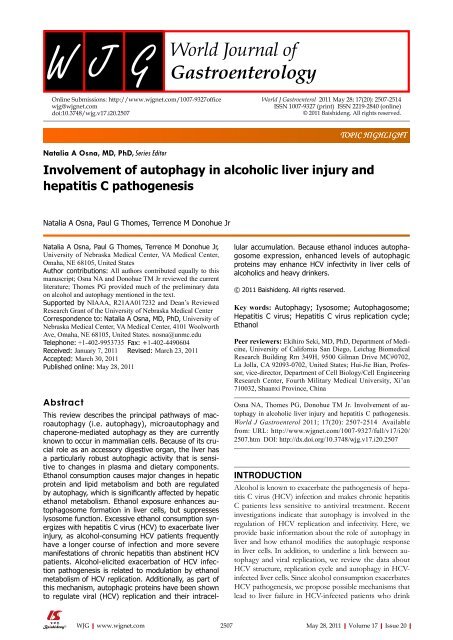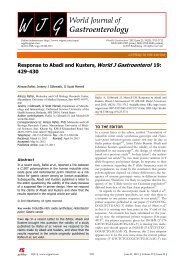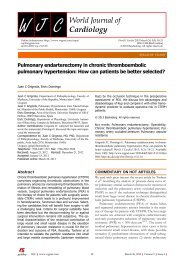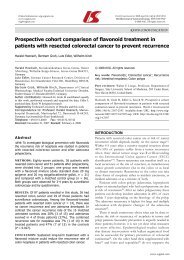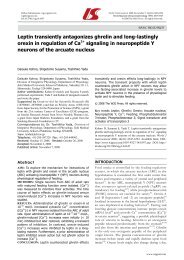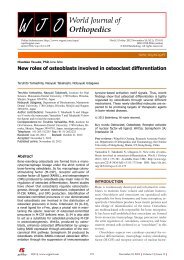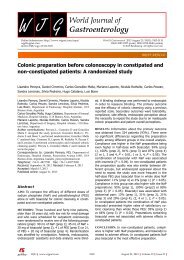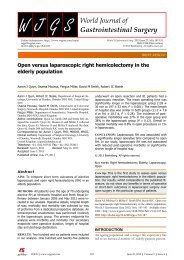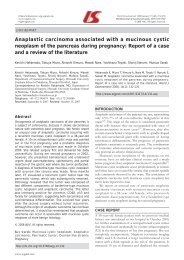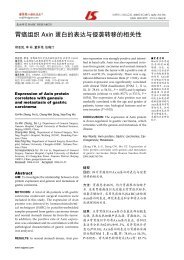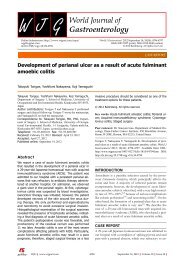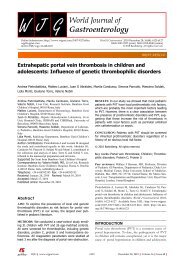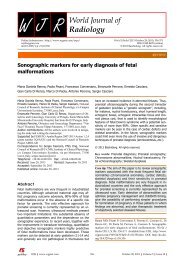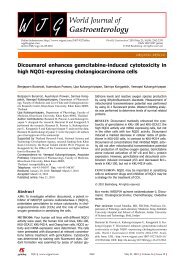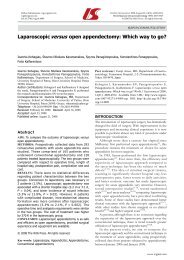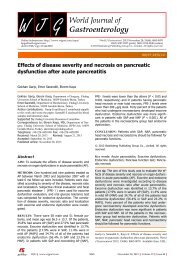20 - World Journal of Gastroenterology
20 - World Journal of Gastroenterology
20 - World Journal of Gastroenterology
You also want an ePaper? Increase the reach of your titles
YUMPU automatically turns print PDFs into web optimized ePapers that Google loves.
Online Submissions: http://www.wjgnet.com/1007-9327<strong>of</strong>fice<br />
wjg@wjgnet.com<br />
doi:10.3748/wjg.v17.i<strong>20</strong>.2507<br />
Natalia A Osna, MD, PhD, Series Editor<br />
TOPIC HIGHLIGHT<br />
Involvement <strong>of</strong> autophagy in alcoholic liver injury and<br />
hepatitis C pathogenesis<br />
Natalia A Osna, Paul G Thomes, Terrence M Donohue Jr<br />
Natalia A Osna, Paul G Thomes, Terrence M Donohue Jr,<br />
University <strong>of</strong> Nebraska Medical Center, VA Medical Center,<br />
Omaha, NE 68105, United States<br />
Author contributions: All authors contributed equally to this<br />
manuscript; Osna NA and Donohue TM Jr reviewed the current<br />
literature; Thomes PG provided much <strong>of</strong> the preliminary data<br />
on alcohol and autophagy mentioned in the text.<br />
Supported by NIAAA, R21AA017232 and Dean’s Reviewed<br />
Research Grant <strong>of</strong> the University <strong>of</strong> Nebraska Medical Center<br />
Correspondence to: Natalia A Osna, MD, PhD, University <strong>of</strong><br />
Nebraska Medical Center, VA Medical Center, 4101 Woolworth<br />
Ave, Omaha, NE 68105, United States. nosna@unmc.edu<br />
Telephone: +1-402-9953735 Fax: +1-402-4490604<br />
Received: January 7, <strong>20</strong>11 Revised: March 23, <strong>20</strong>11<br />
Accepted: March 30, <strong>20</strong>11<br />
Published online: May 28, <strong>20</strong>11<br />
Abstract<br />
This review describes the principal pathways <strong>of</strong> macroautophagy<br />
(i.e. autophagy), microautophagy and<br />
chaperone-mediated autophagy as they are currently<br />
known to occur in mammalian cells. Because <strong>of</strong> its crucial<br />
role as an accessory digestive organ, the liver has<br />
a particularly robust autophagic activity that is sensitive<br />
to changes in plasma and dietary components.<br />
Ethanol consumption causes major changes in hepatic<br />
protein and lipid metabolism and both are regulated<br />
by autophagy, which is significantly affected by hepatic<br />
ethanol metabolism. Ethanol exposure enhances autophagosome<br />
formation in liver cells, but suppresses<br />
lysosome function. Excessive ethanol consumption synergizes<br />
with hepatitis C virus (HCV) to exacerbate liver<br />
injury, as alcohol-consuming HCV patients frequently<br />
have a longer course <strong>of</strong> infection and more severe<br />
manifestations <strong>of</strong> chronic hepatitis than abstinent HCV<br />
patients. Alcohol-elicited exacerbation <strong>of</strong> HCV infection<br />
pathogenesis is related to modulation by ethanol<br />
metabolism <strong>of</strong> HCV replication. Additionally, as part <strong>of</strong><br />
this mechanism, autophagic proteins have been shown<br />
to regulate viral (HCV) replication and their intracel-<br />
WJG|www.wjgnet.com<br />
2507<br />
<strong>World</strong> J Gastroenterol <strong>20</strong>11 May 28; 17(<strong>20</strong>): 2507-2514<br />
ISSN 1007-9327 (print) ISSN 2219-2840 (online)<br />
© <strong>20</strong>11 Baishideng. All rights reserved.<br />
lular accumulation. Because ethanol induces autophagosome<br />
expression, enhanced levels <strong>of</strong> autophagic<br />
proteins may enhance HCV infectivity in liver cells <strong>of</strong><br />
alcoholics and heavy drinkers.<br />
© <strong>20</strong>11 Baishideng. All rights reserved.<br />
Key words: Autophagy; Iysosome; Autophagosome;<br />
Hepatitis C virus; Hepatitis C virus replication cycle;<br />
Ethanol<br />
Peer reviewers: Ekihiro Seki, MD, PhD, Department <strong>of</strong> Medicine,<br />
University <strong>of</strong> California San Diego, Leichag Biomedical<br />
Research Building Rm 349H, 9500 Gilman Drive MC#0702,<br />
La Jolla, CA 9<strong>20</strong>93-0702, United States; Hui-Jie Bian, Pr<strong>of</strong>essor,<br />
vice-director, Department <strong>of</strong> Cell Biology/Cell Engineering<br />
Research Center, Fourth Military Medical University, Xi’an<br />
710032, Shaanxi Province, China<br />
Osna NA, Thomes PG, Donohue TM Jr. Involvement <strong>of</strong> autophagy<br />
in alcoholic liver injury and hepatitis C pathogenesis.<br />
<strong>World</strong> J Gastroenterol <strong>20</strong>11; 17(<strong>20</strong>): 2507-2514 Available<br />
from: URL: http://www.wjgnet.com/1007-9327/full/v17/i<strong>20</strong>/<br />
2507.htm DOI: http://dx.doi.org/10.3748/wjg.v17.i<strong>20</strong>.2507<br />
INTRODUCTION<br />
Alcohol is known to exacerbate the pathogenesis <strong>of</strong> hepatitis<br />
C virus (HCV) infection and makes chronic hepatitis<br />
C patients less sensitive to antiviral treatment. Recent<br />
investigations indicate that autophagy is involved in the<br />
regulation <strong>of</strong> HCV replication and infectivity. Here, we<br />
provide basic information about the role <strong>of</strong> autophagy in<br />
liver and how ethanol modifies the autophagic response<br />
in liver cells. In addition, to underline a link between autophagy<br />
and viral replication, we review the data about<br />
HCV structure, replication cycle and autophagy in HCVinfected<br />
liver cells. Since alcohol consumption exacerbates<br />
HCV pathogenesis, we propose possible mechanisms that<br />
lead to liver failure in HCV-infected patients who drink<br />
May 28, <strong>20</strong>11|Volume 17|Issue <strong>20</strong>|


